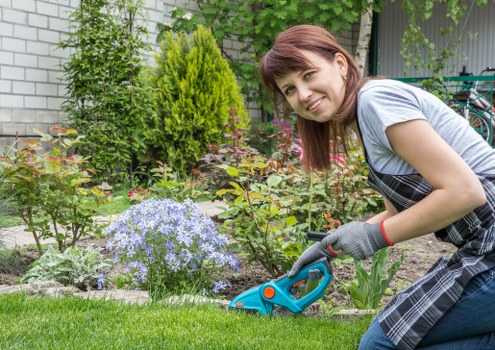Comprehensive Guide to Garden Maintenance in Gipsy Hill
Introduction to Garden Maintenance

Welcome to your ultimate resource for garden maintenance in Gipsy Hill. Whether you're a seasoned gardener or a novice looking to cultivate a beautiful outdoor space, maintaining your garden requires dedication, knowledge, and the right tools.
Gipsy Hill boasts a unique climate and soil composition that influences the types of plants that thrive here. Understanding these local conditions is essential for effective garden upkeep.
Regular maintenance not only enhances the aesthetic appeal of your garden but also ensures the health and longevity of your plants.
Understanding Gipsy Hill's Climate and Soil

The climate in Gipsy Hill is characterized by mild winters and warm summers, with occasional rainfall throughout the year. This temperate climate is conducive to a wide variety of plants, but it also presents specific challenges that gardeners must navigate.
The soil in Gipsy Hill varies, but it generally consists of a mix of clay and loam. This composition affects drainage and nutrient retention, which are critical factors in plant health.
To optimize your garden's potential, it's important to test your soil and amend it as necessary to suit the needs of your chosen plants.
Essential Garden Maintenance Tasks

Maintaining a garden involves a series of tasks that, when performed regularly, keep your outdoor space thriving. Here are some essential maintenance activities:
- Pruning: Regularly trimming plants encourages healthy growth and removes dead or diseased branches.
- Weeding: Keeping weeds under control prevents them from competing with your plants for nutrients and water.
- Watering: Consistent watering schedules ensure that plants receive the moisture they need without overwatering.
Implementing these tasks systematically can significantly improve the overall health and appearance of your garden.
Choosing the Right Plants for Gipsy Hill

Selecting plants that are well-suited to Gipsy Hill's environment is crucial for a successful garden. Consider native species as they are adapted to the local climate and soil conditions, making them more resilient and easier to maintain.
Additionally, incorporating a mix of perennials and annuals can provide year-round color and interest, while also promoting biodiversity.
Consulting with local nurseries or gardening experts can help you make informed decisions about plant selection.
Seasonal Garden Maintenance Tips

Each season brings its own set of challenges and opportunities for garden maintenance in Gipsy Hill. Adapting your maintenance routine to the changing seasons can help your garden remain healthy and vibrant throughout the year.
- Spring: Focus on planting new seeds, pruning, and preparing the soil for the growing season.
- Summer: Maintain consistent watering, monitor for pests, and ensure plants are adequately supported.
- Autumn: Clear fallen leaves, prune dead branches, and prepare plants for the winter months.
- Winter: Protect sensitive plants, plan for the next gardening season, and perform equipment maintenance.
Adhering to a seasonal maintenance schedule can enhance the resilience and beauty of your garden.
Tools and Equipment for Effective Maintenance
Having the right tools is essential for efficient garden maintenance. Some must-have tools include:
- Pruners and Shears: For precise trimming and shaping of plants.
- Garden Fork: Useful for soil aeration and turning.
- Watering Can or Hose: Ensures plants receive adequate hydration.
Investing in quality tools can make maintenance tasks easier and more effective, ultimately benefiting the health of your garden.
Pest and Disease Management
Managing pests and diseases is a critical aspect of garden maintenance. Early detection and intervention can prevent minor issues from escalating into serious problems.
Implement integrated pest management (IPM) techniques, such as introducing beneficial insects, using organic pesticides, and maintaining plant health to naturally resist infestations.
Regularly inspect your plants for signs of distress and address issues promptly to maintain a healthy garden ecosystem.
Mulching and Soil Health
Mulching is an effective practice that benefits both the soil and plants. It helps retain moisture, suppress weeds, and regulate soil temperature.
Organic mulches, such as compost or bark, enrich the soil as they decompose, enhancing its fertility and structure.
Apply a layer of mulch around your plants to improve soil health and reduce maintenance efforts.
Irrigation Systems for Efficient Watering
Implementing efficient irrigation systems can save water and ensure your plants receive consistent hydration. Consider drip irrigation or soaker hoses, which deliver water directly to the root zone, minimizing evaporation and runoff.
Automated irrigation systems with timers can further streamline the watering process, allowing for precise scheduling based on your garden's needs.
Proper irrigation not only conserves water but also promotes healthier plant growth.
Landscape Design and Aesthetics
A well-designed garden balances functionality with visual appeal. Consider factors such as plant variety, color schemes, and structural elements like pathways and garden beds.
Incorporating elements like seating areas, lighting, and decorative features can enhance the enjoyment and usability of your outdoor space.
Thoughtful landscape design contributes to a cohesive and inviting garden environment.
Professional Garden Maintenance Services
Hiring professional garden maintenance services in Gipsy Hill can alleviate the workload and ensure expert care for your garden. Professionals bring specialized knowledge, experience, and equipment to handle various maintenance tasks efficiently.
Service offerings typically include pruning, weeding, pest control, soil management, and seasonal landscaping.
Partnering with a reliable garden maintenance provider can help you achieve a thriving and beautiful garden with minimal effort.
DIY Garden Maintenance Tips
If you prefer a hands-on approach, here are some DIY tips for effective garden maintenance in Gipsy Hill:
- Plan Your Garden Layout: Organize your plants based on their sunlight and water requirements.
- Regularly Inspect Plants: Early detection of issues can prevent larger problems down the line.
- Maintain Tools: Keep your gardening tools clean and sharp for optimal performance.
By implementing these strategies, you can maintain a healthy and attractive garden on your own.
Sustainable Gardening Practices
Adopting sustainable practices in your garden not only benefits the environment but also enhances the health of your plants. Consider the following sustainable gardening tips:
- Composting: Recycle organic waste to create nutrient-rich compost for your soil.
- Rainwater Harvesting: Collect and use rainwater for irrigation to conserve resources.
- Native Plant Selection: Choose plants that are naturally adapted to the local climate and require fewer inputs.
Implementing sustainable practices contributes to a resilient and eco-friendly garden.
Maintaining Garden Health
Ensuring the overall health of your garden involves a combination of proper care, timely interventions, and ongoing monitoring. Key aspects include:
- Balanced Fertilization: Provide essential nutrients in appropriate amounts to support plant growth.
- Proper Drainage: Prevent waterlogging by ensuring adequate drainage systems are in place.
- Regular Pruning: Remove dead or overcrowded branches to promote airflow and reduce disease risk.
By focusing on these areas, you can maintain a vibrant and thriving garden.
Lighting and Irrigation Integration
Integrating lighting and irrigation systems enhances both the functionality and aesthetics of your garden. Well-placed lighting highlights key features and provides safety during evening hours, while efficient irrigation ensures plants receive consistent moisture.
Smart irrigation controllers can adjust watering schedules based on weather conditions, optimizing water usage and plant health.
Combining these systems creates a harmonious and practical garden environment.
Seasonal Planting Strategies
Implementing seasonal planting strategies can maximize the beauty and productivity of your garden. Plan your plantings to ensure continuous blooms and harvests throughout the year.
Consider layering plants with varying bloom times and selecting species that support each other’s growth.
Strategic planting contributes to a dynamic and engaging garden landscape.
Garden Maintenance Schedule
Establishing a maintenance schedule helps you stay organized and ensures that all necessary tasks are performed regularly. A typical schedule might include:
- Weekly: Weeding, watering, and general plant inspection.
- Monthly: Pruning, fertilizing, and pest control.
- Seasonally: Soil testing, major landscaping projects, and seasonal plantings.
Adhering to a structured schedule promotes consistency and garden health.
Integrating Technology in Garden Maintenance
Modern technology offers various tools to enhance garden maintenance efficiency. From automated irrigation systems to garden management apps, technology can streamline many maintenance tasks.
Smart sensors can monitor soil moisture levels, enabling precise watering schedules and reducing water waste.
Embracing technology in your gardening routine can lead to more effective and sustainable garden care.
Enhancing Garden Biodiversity
Promoting biodiversity in your garden creates a balanced ecosystem that supports beneficial insects, birds, and other wildlife. Diverse plant selections provide habitat and food sources, contributing to a healthier garden environment.
Incorporate a variety of plant types, including flowering plants, shrubs, and ground covers, to enhance biodiversity.
A biodiverse garden is not only more resilient but also more visually appealing.
Maintaining Garden Pathways and Structures
Pathways and garden structures such as pergolas, gazebos, and fences add both functionality and aesthetic value to your garden. Regular maintenance of these elements ensures safety and longevity.
Clean and repair pathways to prevent trip hazards, and inspect structures for any signs of wear or damage.
Well-maintained pathways and structures enhance the overall appeal and usability of your garden space.
Winterizing Your Garden
Preparing your garden for winter is crucial to protect plants from frost and harsh weather conditions. Steps include:
- Mulching: Apply a thick layer of mulch to insulate plant roots.
- Covering Plants: Use frost cloths or burlap to protect sensitive plants.
- Cleaning Tools: Sharpen and store gardening tools properly.
Proper winterization safeguards your garden, ensuring a healthy start for the next growing season.
Conclusion
Effective garden maintenance in Gipsy Hill involves a combination of regular tasks, strategic planning, and an understanding of local environmental factors. By implementing the tips and practices outlined in this guide, you can cultivate a vibrant and sustainable garden that enhances your outdoor living space.
Whether you choose to maintain your garden yourself or enlist professional services, the key to success lies in consistent care and a proactive approach to garden health.
Contact us today to learn more about our garden maintenance services in Gipsy Hill and transform your garden into a thriving paradise.